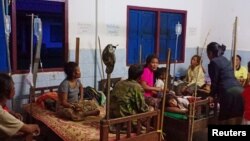Sexual and gender-based violence rises after natural disasters, with distress levels increasing because of stress, economic pressure and other factors, according to a study by the International Federation of Red Cross and Red Crescent Societies.
Some 1,800 people affected by storms and floods in Indonesia, Laos and the Philippines were surveyed for the study, which was based on earlier research done in Australia, Canada, Japan, New Zealand and the United States.
Red Cross spokesman Matthew Cochrane tells VOA that the new study — the first-ever conducted in developing countries — corroborates the earlier findings.
"It found that community members in all the countries reported and were distressed by the rise in domestic violence and in child marriage," he said. "It found that people were also very worried about trafficking and overcrowding in humanitarian shelters and the lack of support provided to women and men from sexual minority groups."
Cochrane says the report is the first to examine the risks of sexual and gender-based violence for men, boys and sexual minority groups, such as gay men, lesbian women and transgendered people.
"The report's authors were very clear that disasters do not create sexual and gender-based violence," he said. "These are issues that are already present in communities, and perhaps what they do is they worsen them or simply make them much more prominent and much more visible."
The Red Cross Federation says more must be done to protect people from sexual and gender-based violence after disasters.
It recommends that spaces be created in evacuation centers to separate women and men; it calls for separate and lockable toilets and adequate lighting; and it says survivors of sexual abuse should receive specialized care.




